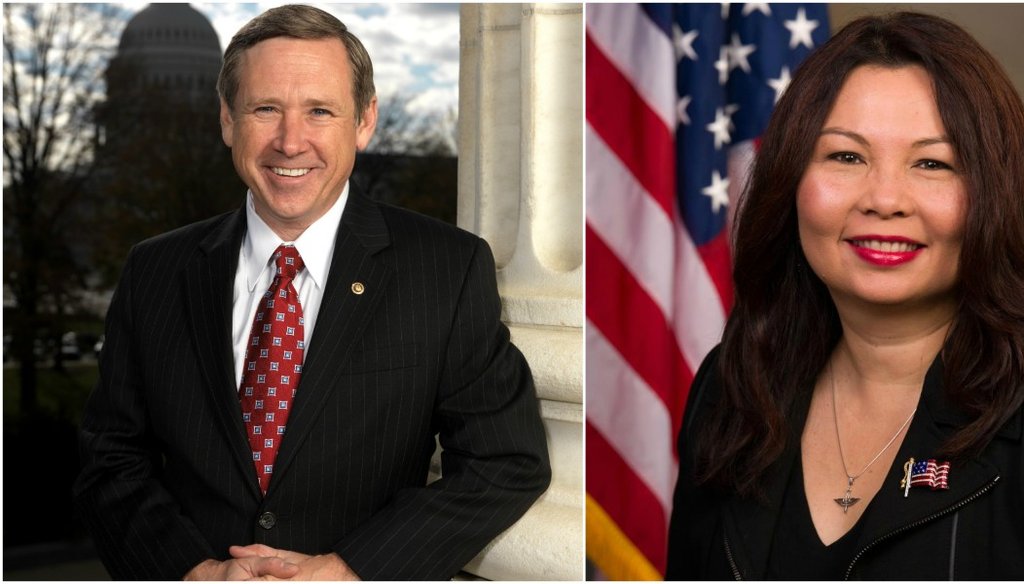Get PolitiFact in your inbox.

Incumbent Sen. Mark Kirk and Democratic opponent Rep. Tammy Duckworth.
U.S. Sen. Mark Kirk falsely attacks Duckworth on IRS expansion
Does U.S. Rep. Tammy Duckworth want more Internal Revenue Service auditors coming after taxpayers?
As U.S. Sen. Mark Kirk, a Wilmette Republican, ratchets up his first re-election campaign, he recently suggested his Democratic opponent in one of the nation’s most competitive Senate contests was strongly in support of expanding the Internal Revenue Service.
In a campaign website press release, the Kirk campaign called Duckworth "a staunch supporter" of expanding the federal agency that collects taxes and audits taxpayers, businesses and organizations.
We wondered if the suburban Democrat really did want more taxing, collecting and auditing out of the IRS.
The context
The IRS came under majority Republican fire in recent years for what the GOP said was the tax agency targeting conservative-leaning nonprofits. In 2013, IRS division head Lois Lerner apologized and acknowledged the agency had targeted certain groups for audits of their tax-exempt status.
In response, Republicans offered several pieces of legislation designed to rein in the agency taxpayers love to hate. U.S. Rep. Peter Roskam, R-Wheaton, sponsored legislation that came up for a vote last April called the "Preventing IRS Abuse and Protecting Free Speech Act."
His proposal was one of four cited by Kirk campaign spokeswoman Eleni Demertzis to support the claim that Duckworth was a strong supporter of expanding the IRS reach.
According to the federal government website Congress.gov, Roskam’s bill would prohibit the IRS from requiring tax-exempt organizations to include details about their contributors in annual returns.
Party-line votes
Duckworth was one 182 Democrats who opposed what was, primarily, a party-line vote.
Kent Redfield, a political science professor emeritus at the University of Illinois-Springfield who specializes in campaign finance, said the Roskam bill was more focused on political donors and freeing nonprofit groups from having to disclose to the IRS who was funding them.
To suggest the bill is about IRS expansion is "a mischaracterization of what the bill is about," Redfield said. "There’s a policy argument there about how much transparency you need, but it isn’t about protecting taxpayers."
Roskam’s bill was opposed by the Center for Responsive Politics and other groups that favor campaign funding transparency, Redfield said. "That’s just too broad," he said. "It’s a mischaracterization of the issues and the intent of what the legislation was. It’s painting with too broad a brush."
Three other IRS-related bills were cited by the Kirk campaign to back up his claim: HR 4890, HR1206 and HR 4885.
HR 1206 would ban the IRS from hiring new employees if any current workers had serious federal tax debt. It would require the agency to certify its employees didn’t owe back taxes. HR 4885 required the tax agency to deposit fees into the treasury and prohibited it from spending without congressional approval. The last bill, HR 4890, would have stopped the IRS from giving employee bonuses until the treasury secretary submitted to Congress a customer service improvement plan.
John Frendreis, a Loyola University political science professor, explained the federal government has something called a senior executive service in which some managers give up some civil service protections and in place of that get bonuses.
Duckworth’s opposition to a bill that would restrict bonuses could be seen as a vote to increase IRS spending. Still, Frendreis said it’s important to keep in mind the Republican-controlled Congress has been progressively shrinking the IRS budget in recent years. "It’s really incorrect to say she’s trying to expand the power of the IRS. She’s simply trying to maintain the level of resources necessary for the IRS to do its work."
"It’s technically true, but not totally true," he added. "The rest are really strong distortions."
And while Duckworth voted against a bill to ban bonuses and against one that curbed IRS hiring, in both cases, Duckworth Deputy Campaign Manager Matt McGrath noted, the nonpartisan Congressional Budget Office analyses of the bills concluded that, overall, they could boost IRS spending by as much as $2.5 million. So, it also could be argued Duckworth’s opposition represented votes to contain the IRS budget.
In the case of HR 4885, the bill to require the IRS deposit fees and get legislative approval for spending, the CBO concluded the bill Duckworth opposed would not actually reduce costs at the tax agency.
McGrath also pointed to three bills Duckworth supported in 2014 and 2015 that cut IRS spending or held it flat.
All four votes cited by the Kirk campaign to back up their claim about Duckworth resulted in partisan roll calls with most Democrats opposing them and most Republicans supporting them.
"It does look like all of these are party-line votes," noted David Yepsen, executive director of the Paul Simon Public Policy Institute at Southern Illinois University in Carbondale. "There's a lot of hyperbole in this description. There are a lot of subjective phrases and words there."
"This is an unpopular agency," Frendreis said. "It’s an easy target. The purpose of these bills in the first place is to establish this campaign narrative."
Our ruling
Kirk called Duckworth a staunch supporter of expanding the spending and sweep of the nation’s tax agency.
The record shows Duckworth joined most Democrats in opposing four GOP efforts to restrict the agency’s information collection and boost congressional oversight. But independent experts and Congress’ own nonpartisan budget analyst said some of the GOP bills actually would boost spending or would not cut it. Duckworth also has voted for large spending bills that did trim IRS budgets.
We rate this claim False.
https://www.sharethefacts.co/share/e1a9b559-5061-4c2f-ad2f-e9add8a6ea43Our Sources
Kirk for Senate Campaign website, "Duckworth votes against taxpayer privacy protection from IRS," accessed June 15, 2016
Kirk for Senate Communications Director Eleni Demertzis, email interview, June 21, 2016
Congress.gov Description and Record of HR5053, accessed on June 28, 2016
Clerk of the House Roll Call on HR5053, passed 240-182 with 1 Democrat voting yes. accessed June 21, 2016
Congress.gov Description and Record of HR4890, accessed on June 29, 2016
Clerk of the House Roll Call on HR4890, passed 260-158 with 22 Democrats voting yes, accessed June 29, 2016
Congress.gov Description and Record of HR1206, accessed on June 29, 2016
Clerk of the House Roll Call on HR1206, passed 254-170 with 11 Democrats voting yes. Accessed June 29, 2016
Congress.gov Description and Record of HR4885, accessed July 6, 2016
Clerk of the House Roll Call on HR 4885, passed 245-179 with 1 Democrat voting yes, accessed July 6, 2016
David Yepsen, executive director of the Paul Simon Public Policy Institute, phone interview July 5, 2016
Kent Redfield, a political science professor emeritus at the University of Illinois-Springfield who specializes in campaign finance, phone interview, July 7, 2016
John Frendreis, political science professor, Loyola University, phone interview, July 7, 2016
New York Times, "I.R.S. Apologizes to Tea Party Groups Over Audits of Applications for Tax Exemption," accessed June 28, 2016
Tammy Duckworth for Senate, Deputy Campaign Manager Matt McGrath, email interview, July 14, 2016
Congress.gov Description and Record of HR2029, accessed July 19, 2016
Clerk of the House Roll Call on HR 2029, passed 316-118 with 166 Democrats voting yes, accessed July 19, 2016
Center on Budget and Policy Priorities, "IRS Funding Cuts Compromise Taxpayer Service and Weaken Enforcement," accessed July 19, 2016
Government Executive, "IRS Spared Some Budget Cuts But Loses Power to Curb Nonprofits," accessed July 19, 2016
Congressional Record, "Personal Explanation," accessed July 19, 2016
Congress.gov, "H.R. 83-Consolidated and Further Continuing Appropriations Act, 2015," accessed July 20, 2016
Forbes, "IRS Gets Hammered in the 2014 Budget Agreement," accessed July 20,2016
Wall Street Journal, "IRS to Hire Up to 700 Enforcement Workers," accessed July 20, 2016
Congressional Budget Office, "H.R. 4890, a bill to impose a ban on the payment of bonuses to employees of the Internal Revenue Service until the Secretary of the Treasury develops and implements a comprehensive customer service strategy," accessed July 20, 2016
Congressional Budget Office, "H.R. 1206 No Hires for the Delinquent IRS Act," Accessed July 20, 2016
Congressional Budget Office, "H.R. 4885, IRS Oversight While Eliminating Spending (OWES) Act of 2016," accessed July 20, 2016
Congressional Budget Office, "H.R. 4885, IRS Oversight While Eliminating Spending (OWES) Act of 2016," accessed July 20, 2016
Congress.gov, "H.R.3547 - Consolidated Appropriations Act, 2014," accessed July 20, 2016, passed 359-67, accessed July 20, 2016
Clerk of the House, House Roll Call 21 on concurring with Senate amendments on H.R. 3547, accessed July 20, 2016
Politico, "Omnibus cuts IRS budget, bans funds from being used to target individuals – SCOTUS to hear severance pay case," accessed July 20, 2016
Browse the Truth-O-Meter
More by Madeleine Doubek
U.S. Sen. Mark Kirk falsely attacks Duckworth on IRS expansion
Support independent fact-checking.
Become a member!
In a world of wild talk and fake news, help us stand up for the facts.











































